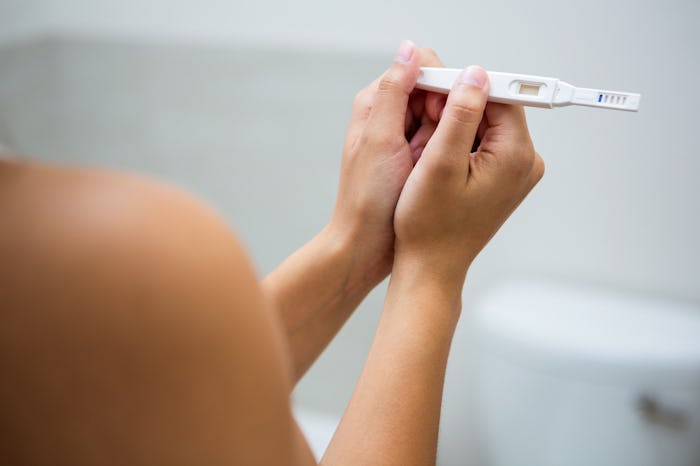Life

What Does POAS Mean? Plus 7 Ways To Do It Right
If you’ve hung around the parenting and trying to conceive boards for very long, then you know these communities can offer tremendous support to people at all stages of the baby raising process. These boards cover everything from toddler meltdowns to ovulation tracking methods. Their lingo, however, comes with a bit of a learning curve. Like many corners of the internet, these boards have their own abbreviations for commonly used terms and concepts. Although it’s helpful once you’re in the swing of things, keeping all of these terms straight can be tricky for newcomers. So what does POAS mean on parenting boards?
Well, it’s shorthand for pee on a stick, or what you have to do to take a pregnancy test. You have to admire the community’s straightforward attitude to this rather private aspect of the journey to conception. There’s no place for euphemisms in the parenting world, even for those who are trying to become parents for the first time.
Though peeing on a stick might be the most easy task of all — literally anyone can do it — there are actually a few ways to get the most effective reading. After all, when it comes to pregnancy, you want to know about it as soon as possible and with 100 percent certainty. Here are a few tips to help you get tested as accurately and quickly as possible.
1Wait A Week
Sure, you want to POAS as soon as you think conception might have occurred. It's only normal to be excited. But if you follow advice from the Mayo Clinic and wait at least a day after your missed period — or better yet a full week — your results may be more accurate. As the Mayo Clinic further explained, this is because the tests detect the presence of the hormone human chorionic gonadotropin (hCG), and by waiting a few days you give it time to build up in your bloodstream, increasing the likelihood of detection by a test. (Taking it too early might give a false negative if you don't have enough hCG built up yet).
2Be Aware Of Other Medications
Certain medications may interfere with your test results. As WebMD said, you may get a false negative if you are taking medications such as diuretics or antihistamines. If this is the case, then you may want to retake the test when you're off the medication (or go straight to your doctor for a blood test if you can't wait).
3Follow Instructions To The Letter
The tests can vary by brand, and some may instruct you to collect your urine and dip the test in, or even to place the stick in your urine stream. As the American Pregnancy Association notes, it's important to follow these instructions clearly to get accurate results. Sure, it's tempting to just rip open the box and get to testing, but taking a couple minutes to read over the inserts can make your end results more trustworthy.
4Test Early In The Morning
To give your stick the best chance of detecting hCG, it's a good idea to test your urine first thing in the morning. As the Office on Women's Health explained, this may help boost the test's accuracy. Of course, actually making yourself go to sleep with the pregnancy question hanging over your head is another story entirely.
5Check The Expiration Date
If that test has been hanging out in your bathroom cabinet forever, then it may not provide the most accurate results. As Planned Parenthood said, the test can be less accurate if you take it after the expiration date has passed. And when it comes to pregnancy tests, you want those things to be as accurate as possible.
6Wait A While
If you have irregular periods, then knowing when to test can be a difficult task. The National Health Services recommends you wait at least three weeks after your potential conception to start testing. This will give the hCG time to build up if you are indeed pregnant.
7Don't Dilute Your Urine
Chugging multiple bottles of water could skew your test results. Taking in lots of fluid could dilute your urine, decreasing the concentration of hCG and making it difficult to detect, as New Health Advisor noted. This doesn't mean you have to be dehydrated all day, just try to test earlier in the morning when things are more concentrated.